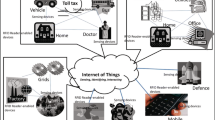Abstract
IPTV, a technological convergence that combines communication and broadcasting technologies, delivers customized, interactive TV content and other multimedia information over wired and wireless connections. Providing secure access to IPTV services calls for authentication, without proper and secure authentication mechanisms, an individual impersonating a subscriber could steal a service. This paper proposes a new authentication protocol to authenticate IPTV users. The authors based the proposed protocol, a hybrid authentication protocol providing lightweight, personalized user authentication, on RFID (radio-frequency identification) and USIM (Universal Subscriber Identity Module) technologies. In the proposed protocol, USIM performs highly personalized authentication, and the authenticated subscriber’s RFID tags can have a temporary authority to execute authentication. These RFID tags become Agent Tags authorized to authenticate subscribers. Agent Tags identify and authenticate themselves to RFID readers in the set-top box, thus, simplifying the authentication process.






Similar content being viewed by others
References
Huang YL, Shieh S, Ho F-S, Wan JC (2004) Efficient key distribution schemes for secure media delivery in pay-TV systems. IEEE Trans Multimedia 6(5):760–769
Jabbar H, Jeong T, Hwang J, Park G (2008) Viewer identification and authentication in IPTV using RFID technique. IEEE Trans Consum Electron 54(1):105–109
Jiang T, Hou Y, Zheng S (2004) Secure communication between set-top box and smart card in DTV broadcasting. IEEE Trans On Consum Electron 50(3):882–886
Johnston D, Walker J (2004) Overview of IEEE 802.16 security. IEEE Secur Privacy 2(3):44–88
Kanjanarim F, Amornraksa T (2001) Scrambling and key distribution scheme for digital television. IEEE Trans Consum Electron 47(1):47–53
Kornfeld M, May G (2007) DVB-H and IP datacast-broadcast to handheld device. IEEE Tans, On Broadcasting 53(1):161–170
Lyu J, Pyo S, Lim J, Kim M, Lim S, Kim S (2007) Design of Open APIs for Personalized IPTV Service. In: International conference on advanced communication technology, Vol. 1, pp. 305-310
Nicole R, Kamperman F, Rijnsoever BV (2001) Conditional access system interoperability through software downloading. IEEE Trans On Consum Electron 47(1):47–53
Park YK, Lim SH, Yi O, Lee SJ, Kim SH (2008) User authentication mechanism using java card for personalized IPTV services. ICHIT, pp 618–626
Tianpu J, Shibao Z, Baofeng L (2004) Key distribution based on hierarchical access control for conditional access system in DTV broadcast. IEEE Trans On Consum Electron 50(1):225–230
Tu FK, Laih CS, Toung SH (1999) On key distribution management for conditional access system on pay-TV system. IEEE Trans Consum Electron 45(1):151–158
Xu S, Matthews MM, Huang CT (2006) Security issue in privacy and key management protocols of IEEE 802.16. In: ACM Southeast Regional Conference, pp 113–118
Yingjiu G, Chuang L, Hao Y, Zhang Z (2007) Design and analysis of IPTV digital copyright management security protocol. ISPACS, pp 554–557
Yoon E-J, Yoo K-Y (2009) Robust key exchange protocol between set-top box and smart card in DTV broadcasting. INFORMATICA 20(1):139–150
Zhang H, Chen C, Zhao L, Yang S, Zhou L (2006) Content protection for IPTV-current state of the art and challenges. IMACS, pp 1680–1685
Acknowledgments
This work was supported by Basic Science Research Programs through the National Research Foundation of Korea (NRF) grand funded by the Korea government (MEST) (No.2010-0013121).
Author information
Authors and Affiliations
Corresponding author
Rights and permissions
About this article
Cite this article
Kim, SC., Yeo, SS. & Kim, S.K. A hybrid user authentication protocol for mobile IPTV service. Multimed Tools Appl 65, 283–296 (2013). https://doi.org/10.1007/s11042-011-0810-5
Published:
Issue Date:
DOI: https://doi.org/10.1007/s11042-011-0810-5




